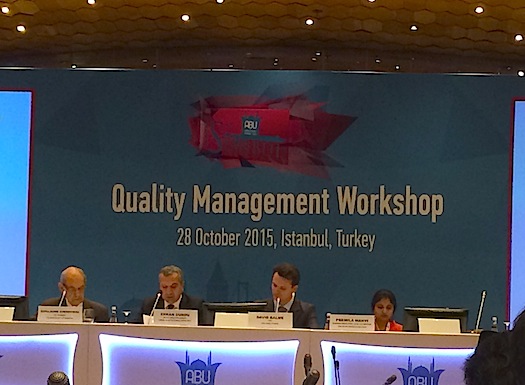The Asia-Pacific Broadcasting Union has taken over the global promotion and further development of the ISAS BCP 9001 quality management standard for Media.
Guillaume Chenevière, former director of the Swiss television TSR and director of the Media and Society Foundation passed responsibility for the standard to ABU Secretary-General Javad Mottaghi during the assembly. A quality management workshop for media executives is part of the activities surrounding the assembly.
The standard was originally developed to promote quality in media by applying best management practices to media companies through a voluntary process of self-regulation. It has been recognized by the professional community worldwide and successfully implemented by media organizations on several continents.
Speaking at the Quality Management Workshop, Turkish Radio & Television’s Erkan Durdu said there have been important developments and new technologies in the media sector and there is a need for guidelines and standards to help broadcasters navigate the changes in the modern media world.
“In the past we had one way information, today people can interact with information. New media is affecting the whole world, so we are trying to survive within new frameworks… we can’t just stand aside and watch. Standards will help us protect our values,” he said.
Discussing the benefits of quality management for media, Guillaume Chenevière (pictured), said:
“There are media organisations that have not embraced transparency and quality… Many media executives also seem more concerned with their financial woes and the technological challenges than with quality management issues such as satisfying the real needs of society or society’s ethical values. The shorter view may look bleak, but I believe that there are reasons for cautious optimism.
“We see many national media organisations striving to protect the public interest, even in the face of inaccuracy and content that is against the public interest. The spread of new media has brought speed, but also a necessity for accuracy.
“There is a dwindling trust in media, which requires a reaction from the industry as a whole. Standards that help us ensure quality are an answer to these kind of challenges, they can help broadcasters serve public interest, support society and contribute to the business success of the organisation.”
Outlining the quality management process, David Balme said “standards help build trust in the media and strengthen audience response.”
He presented information from Reporters Without Borders and Freedom House about press freedom and trust in media, that showed some countries are doing well with media freedom, but that others have declined. Trust in journalists is not always high.
The top media freedom issues identified last year were: religious censorship, violence during demonstrations, the ageing European media model, misleading pretexts of national security, news control (a new weapon of war), large private interests and information control by dictators.
To ensure media freedom, key success factors rely on: fair regulation, independent external control systems, internal quality control, credible leadership and constant focus on values.
There should also be transparency on how decisions are made and internal ethical control systems.
To help broadcasting organisations overcome the issues surrounding media freedom, consistent performance, driven by quality standards, is an important element.
The workshop heard examples of how Thailand’s Public Broadcasting System and radio Romania are implementing quality management systems.
In Switzerland, the regulator now uses the standards philosophy to assess media in a regular study each year. It assesses media’s contribution to society and a range of other factors.


